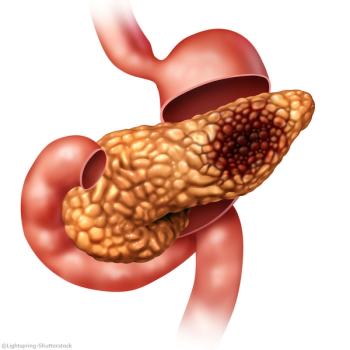
Splice Variant of MUC4 Promotes Pancreatic Cancer Progression
When MUC4/X-overexpressing pancreatic cancer cells were transplanted into mice, tumors grew aggressively, with significant metastasis to liver and peritoneum.
A splice variant of the membrane-bound Mucin 4 (MUC4) gene, MUC4/X, activates the integrin-β1/FAK/ERK pathway and promotes pancreatic cell proliferation, invasion, extracellular matrix adhesion, and metastasis, according to preclinical research
“MUC4/X, a splice variant of oncogenic MUC4, is aberrantly upregulated in poorly differentiated pancreatic tumor tissues,” reported senior author Surinder K. Batra, PhD, from the University of Nebraska Medical Center, Omaha, and coauthors. “Both in vitro and in vivo studies revealed that overexpression of MUC4/X led to increased cell proliferation, invasion, and metastasis.”
The report is among the latest findings implicating alternative RNA splicing in cancer progression. Alternative splicing prior to messenger RNA (mRNA) translation allows one gene to express distinct protein isoforms by including or excluding different exons in RNA transcripts. Mutations in splicing factor genes, which regulate the splicing process, and aberrant splicing variants are suspected to contribute to various cancers and other diseases.
“Molecular mechanisms of oncogenic signaling mediated by aberrantly expressed splice variants remain obscure,” the authors noted.
Transmembrane mucins have been implicated in local tumor invasion and distant metastasis. Previous studies had implicated MUC4 in carcinogenesis via interactions with HER2 and metastasis via increased adhesion to extracellular matrix proteins and implicated an exon-skipped variant of MUC1 in aggressive forms of pancreatic cancer.
The research team sought to identify the role of specific MUC4 splice variants, which lack two exons, in pancreatic cancer.
mRNA expression in pancreatic tumor samples showed significantly unregulated MUC4/X expression compared with normal human pancreatic ductal epithelial cell lines, particularly in poorly differentiated tumors, the authors reported.
In cell-line experiments, the authors confirmed that MUC4/X overexpression enhanced tumor cell proliferation, cell invasion, and motility, compared with healthy control cells. When MUC4/X-overexpressing pancreatic cancer cells were transplanted into mice, pancreatic tumors grew markedly more aggressively than did those resulting from implantation with non–MUC4/X-expressing cells and exhibited higher levels of Ki-67 and integrin-β1 expression. All of the mice with MUC4/X-overexpressing tumors experienced metastasis within 50 days of implantation.
“Peritoneal metastasis is one of the most frequent and deadly forms of pancreatic cancer metastasis,” they noted. “Pancreatic tumors with peritoneal metastasis are highly resistant to chemotherapies, with very poor patient survival [fewer than 12 weeks …] In our orthotopic transplantation studies for MUC4/X, we observed significant metastasis to the liver and peritoneum.”
The study was funded by the US National Institutes of Health.
Newsletter
Stay up to date on recent advances in the multidisciplinary approach to cancer.






































